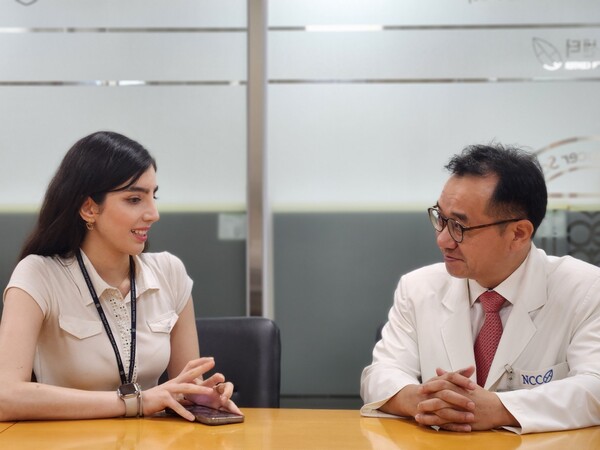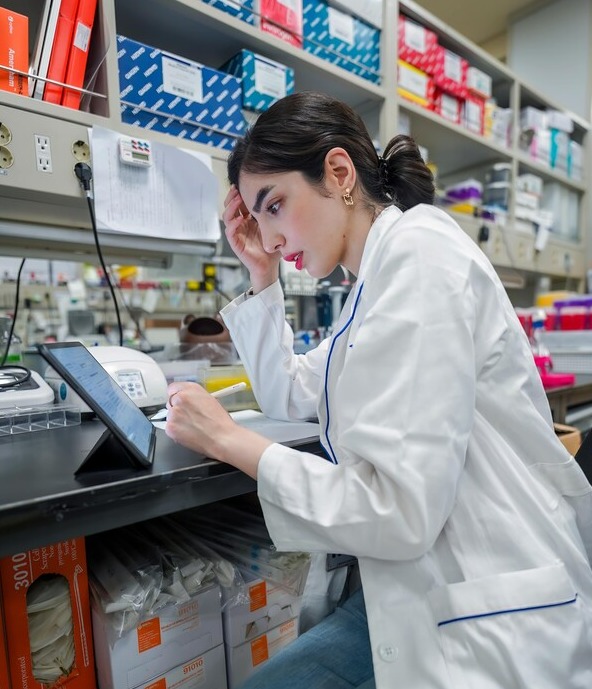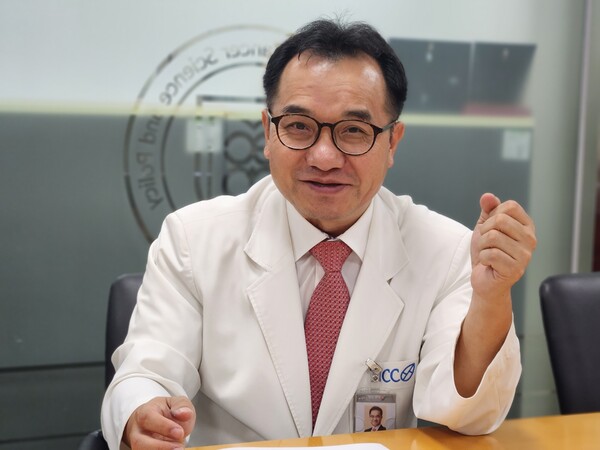Niusha Shariloo, a 28-year-old Iranian, arrived in Korea in 2019 to pursue a Korean language course at Seoul National University (SNU).
However, fate had other plans for her, as she found herself extending her stay for three years to pursue a Master of Science in Cancer Genomics and Medical Cancer Biology.

Shariloo, who recently graduated from the National Cancer Center Graduate School of Cancer Science and Policy (NCC-GCSP) program with honors, spoke to Korea Biomedical Review in an interview Wednesday about her graduate journey at NCC, alongside Professor Myung Seung-kwon, leader of the NCC-GCSP program.
“Nothing worth doing is ever easy but I am glad that I can look back on this experience and feel very satisfied with what I was able to accomplish,” said the Iranian student. “If I did not first come to study Korean, I would not have had the opportunity to come to Korea in 2021 as my country was locked down at that time due to the Covid-19 pandemic.”
‘Pediatric patients at the cancer center piqued my interest in cancer research’
Shariloo attained a bachelor’s degree in Cellular and Molecular Biology in the field of Clinical Biochemistry from the Islamic Azad University of Medical Sciences in Tehran but had not previously engaged in cancer research, so this was a new field for her.
“My interest was first spurred from my engagement with pediatric cancer patients at the Mahak Cancer Children Hospital in Iran through a volunteer program, which made me want to do something to help,” she said.
While studying the Korean language in 2019, she started reading some research papers on cancer-related topics, and a few studies related to cancer proteogenomics published in Nature by her advisor, Professor Kim Young-wook, caught her eye.
This encouraged her to reach out to Kim and she was accepted into the program after doing a three-month internship in Kim's lab.
Shariloo also chose to study at the NCC as she was impressed with the institute.
“It’s quite unique that the school is dedicated to cancer research with the graduate school, the National Cancer Control Institute, the hospital, and the research institute all being located on the same campus providing a great network for research,” she said.
Balancing student life
The NCC-GCSP program was established to train global leaders with theoretical and practical experience in cancer research in three departments including Cancer Control and Population Health, Cancer Biomedical Science, and Cancer AI & Digital Health.
Since 2014, 177 master's students and 18 Ph.D. students have graduated from the program, and are now working in research institutes, hospitals, universities, governments, or pharmaceutical companies in oncology or public health either back home or in Korea, according to Professor Myung.
Approximately half of the students come from foreign countries so the program is officially conducted in English and all students are provided with scholarships to cover tuition fees and daily living expenses once a minimum GPA requirement is maintained, he said.
Regarding eligibility, Myung highlighted the basic requirement to hold a bachelor’s or master’s degree to pursue a master’s or PhD degree respectively but emphasized that they accept students regardless of major.
Despite not having specific requirements for related majors, Shariloo advised that her program was very technical so having related knowledge would be helpful even if not compulsory.
Additionally, she admitted that once the professors discovered her high level of Korean, the classes were conducted in Korean.
Shariloo started learning Korean in 2014 when she received an award to study the Korean language through the prestigious King Sejong Institute in Tehran for four years. Her love and knowledge of Korean history and culture then allowed her to first visit Korea for the Korean Government Invitation Program (KGIP) program in 2016 which is when she realized that she wanted to come back to Korea to study.
However, living in Korea was never easy for her.
Especially for Iranians, she said that there were extra security measures for simple activities such as opening a bank account.
“Living away from home is difficult, combined with the toll of school was quite overwhelming at times for me," she explained.
Despite these challenges, she is an advocate for studying in Korea. She participated in the GKS supporters program where she promoted studying opportunities in Korea but didn’t sugarcoat the experience.
“I was also able to share my honest opinion with the organizers of this government scholarship program to highlight ways to improve educational experiences for foreigners,” she said.
Before coming to Korea, Shariloo started an Instagram account that quickly went viral as she provided advice for Iranian students who wanted to pursue educational opportunities abroad. Overall, she interviewed some 200 Iranians studying all over the world and shared those stories with her followers.
Her social account now has a following of 472,000 persons and she is still conducting interview stories but admittedly, much less frequently as her graduate studies have kept her busy.
In fact, she is responsible for bringing more than a few Iranians over to Korea for different programs and another countrymate directly into the NCC-GCSP program.
She also mentioned another well-known influencer program called the Global Seoul Mates, to help her sometimes escape the stress of her studies.
Challenging but a plethora of opportunities
Shariloo’s research focused on analyzing 10-year data on breast cancer in Korea as the incidence has increased in Korea over the last 20 years. She described the rigorousness of her lab work which required long hours in the lab.
“Nobody forced me to stay in the lab but that's the level of dedication required to succeed,” she reasoned.

“I applied proteogenomic techniques to 126 treatment-naive primary breast cancer samples to distinguish ERBB2-positive proteogenomic status in breast cancer patients with HER2-related diagnoses, who could potentially benefit from ERBB2-targeted therapy through clinically available immuno-oncology drugs,” she said elaborating on her main research topic.
She outlined her intentions to soon publish her work in an academic journal. Despite the challenging atmosphere, Shariloo highlighted the most recent opportunity she had to make her first poster presentation abroad in Sweden for a conference on “Exploring the Human Proteome with Antibodies, Transcriptomics, and Mass Spectrometry,” held by Human Protein Atlas.
“I was accepted for the conference but I missed the deadline to receive funding from the school,” she said. “When my advisor discovered this, he offered to sponsor the trip for me to present my paper.”
This came as a bit of a shock to her as she didn’t expect that offer as she was merely a master’s degree student, she said.
“I am truly grateful to have that support from my professor because it felt like he recognized the value of my work,” she said.
Additionally, she also had the chance to attend other conferences held in Korea including the International Conference of the Korean Society for Molecular and Cellular Biology and the 2021 International Symposium by the Korean Society of Surgical Metabolism and Nutrition (KSSMN).
Regarding plans for her future, she instinctively replied, “I just want to take a break to rest and reset.” However, she noted that she wants to pursue a Ph.D. later on but has not yet decided which field of study and whether or not she will stay in Korea as yet.
“I never start anything that I can’t finish so I want to give it some more thought before making my next big move,” she said.

Meanwhile, the NCC is engaged in projects including the Rare Cancer Research Initiative to improve the cure rate of sarcomas, pediatric cancer, and eye and adnexal cancer. Myung also explained that the NCC is also home to a proton therapy facility –for prostate cancer, eye cancer, or cancers located deep inside the body– which the medical community is fiercely debating against Korea’s first heavy ion therapy device which recently won approval from the Ministry of Food and Drug Safety (MFDS) earlier in March.
There have been claims in media reports due to animal studies that heavy ion therapy is more effective than proton therapy but Myung insisted that there is still not sufficient data to prove these claims.
“Both exhibit the Bragg peak effect, thus limiting radiation to surrounding cells with the ability to focus the radiation energy to more precisely target cancer cells and can therefore offer similar benefits,” he said.
Related articles
- NCC, Korea University license out prognostic breast cancer biomarker to CbsBiosciences
- Korea’s NCC trains healthcare professionals from Côte d'Ivoire
- NCC’s novel anti-cancer fatty acid oxidation inhibitor OKed to begin clinical trials
- NCC finds new breast cancer treatment strategies by boosting anticancer immunity

